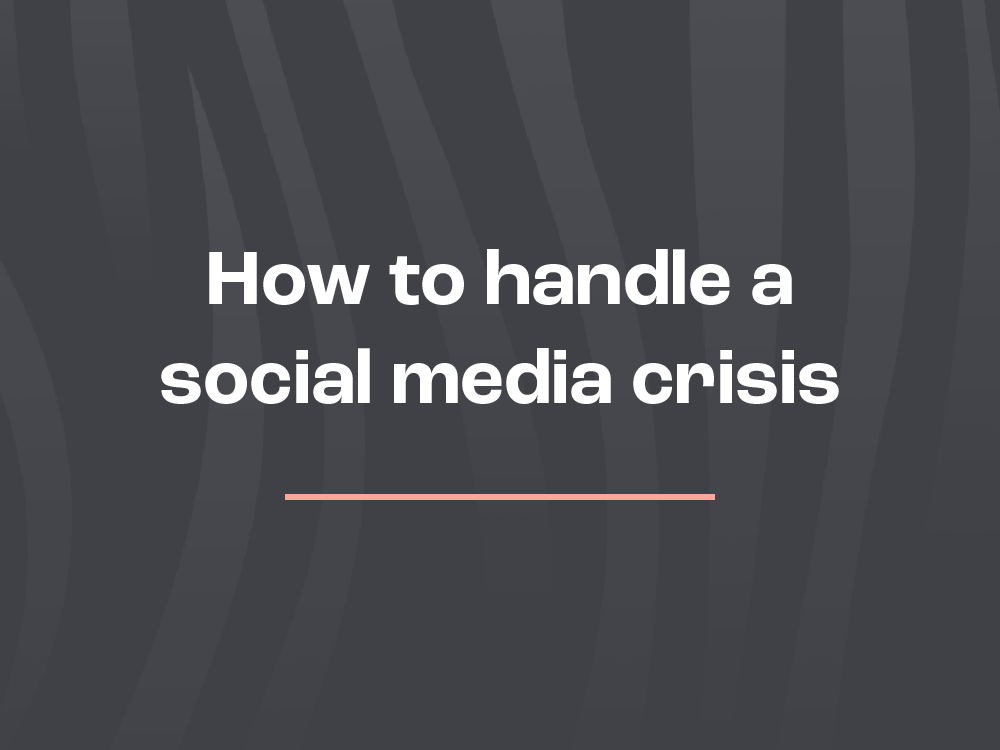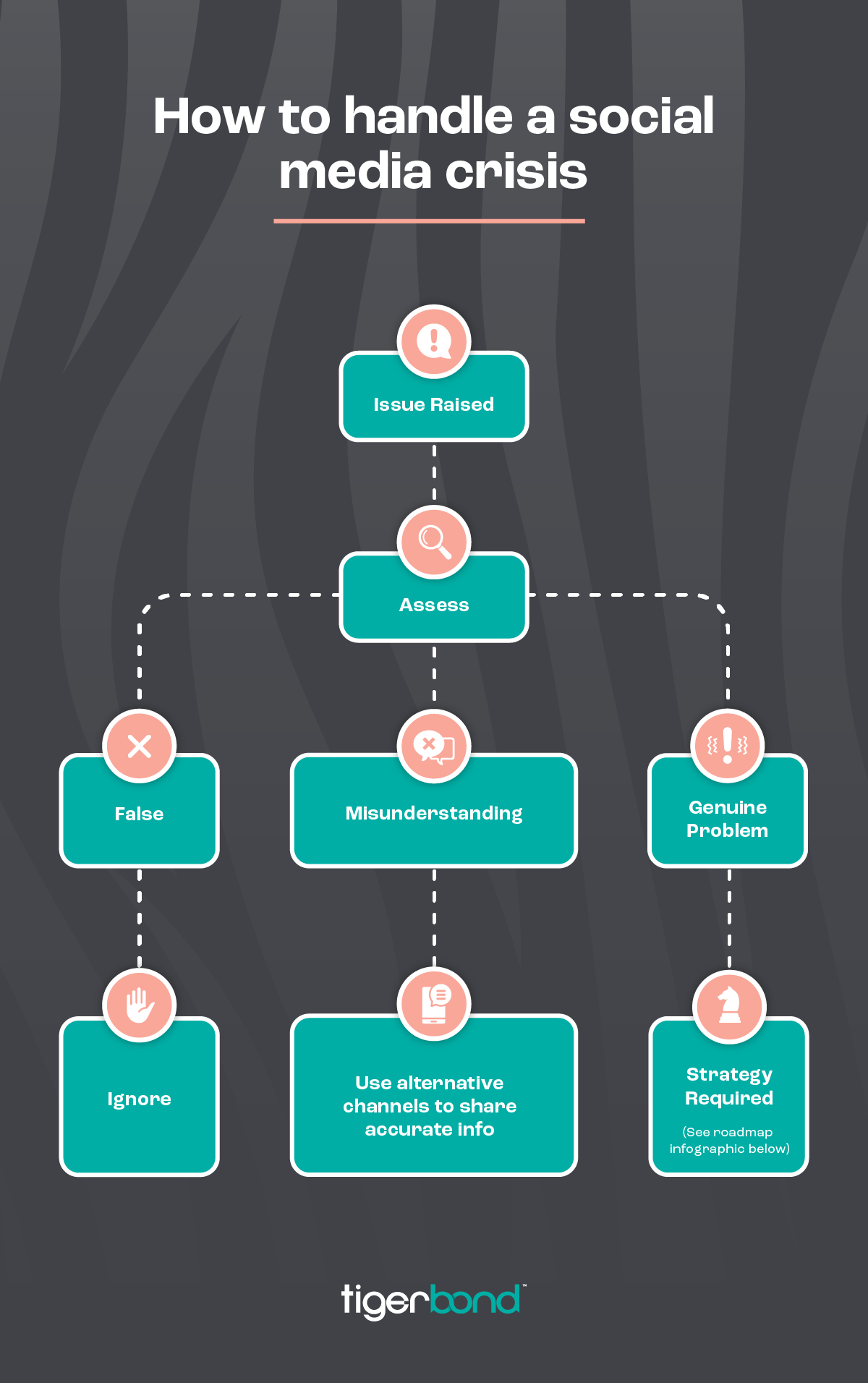
Reputations are comprised of what you do, what you say, and what others say about you.
The idea of ‘cancel culture’ reflects that: social media users voice their stance against a company or public figure that has done and/or said something they deem sufficiently bad to warrant a public boycott.
We’ve all seen examples where this gains traction on social media and is picked up by the press, often leaving companies under pressure as they attempt to recover lost ground.
However, social media is not always reflective of wider public opinion or the silent majority: what at first glance appears to be a large volume of negative feelings can lead organisations to panic and issue a knee-jerk reaction.
Every issue is different, so we are going to look at some basic steps to consider when facing a potential social media storm in this blog.
Contents
- How To Assess the Gravity of a Social Media Crisis
- True Or False: Is What is Being Said Accurate?
- To Engage or Not to Engage, That Is the Question
- Strike The Right Tone: Responding to a Social Media Crisis
- What Have We Learned?
- TL;DR
How to Assess the Gravity of a Social Media Crisis
Genuine activism, calling out poor behaviour, standing up for what is right, criticisms and misunderstandings, are not the same as cancel culture however, they can all result in a crisis for brands who fail to address valid issues.
Issues that affect real people in real ways – particularly those with an emotional, financial or legal element – are most likely to develop into a reputational crisis.
Before doing anything, you should take the time to assess the situation you are facing and plan a response accordingly (and if necessary).
An overreaction can feed social media awareness and engagement, and alert the media to a potential story, that would otherwise have settled on its own.
True or False: Is What is Being Said Accurate?
The speed at which social media moves isn’t the same speed at which you have to react.
Find out the facts first to avoid the danger of issuing a quick – but wrong – response.
Successfully navigating a crisis requires accuracy and consistency from the outset.
Crisis communication example:
Even a basic holding line of “we’re investigating” leads to the assumption that something has happened, immediately putting organisations on the back foot if, in reality, nothing has happened at all.
Check the source: Who is saying it?
Work out who your adversary is, their motives and their influence.
Ask yourself:
- Why have they chosen to take on this argument?
- Do they genuinely think you have done something wrong, or are they simply posturing to assist their own agenda in some way?
- Do they have a proper grasp of all of the facts, or are they missing crucial information?
- Do they have an inherent reason for such special interest in your organisation or the topic they’re advocating against?
- Are they likely to move on or calm down having voiced their initial outrage?
- Could they change their mind?
- Do they influence the attitudes of others?
A reputational PR crisis is when that content or sentiment is seen as credible and tips over into the opinions of those who truly matter such as customers, staff, investors, partners, or indeed the media.
The answer to the above questions should therefore inform whether you engage with them at all and, if so, how you do it.
To Engage or not to Engage, That is the Question
Many organisations feel pressured into responding on social media, but alternative routes that help limit the audience are more beneficial.
Crisis communication examples:
- False Claims
If your adversaries are disingenuous and unwilling to correct the false impression they’re conveying, engaging with them is usually pointless.
Don’t give them credibility or feed the conversation they want to promote in an online conversation that you do not fully control.
- Misunderstandings
If the issue is a misunderstanding, look to alternative channels to get the correct information out to people who are interested in the truth.
The majority of the time social media corrects itself in instances such as this as users who genuinely want to know the real facts feed in information they obtain elsewhere.
- Genuine Problem
If a genuine problem has been established, your response strategy might include social media but be mindful- the more serious the problem, the more likely the communications response needs to be planned in stages.
Words without actions will only make things worse in the long term.
It is always important to remember that social media and the traditional media should not be considered in isolation.
Any comment you make on social media can be picked up by the press, potentially even enabling it to be published when it otherwise could or would not have been.

Strike the Right Tone: Responding to a Social Media Crisis
If you do need to respond, your aim should always be to tell the truth in the most constructive way.
Choose your words carefully.
You should never lie, speculate or stray into areas that are not yours to comment on.
Crisis Communication Example:
Sometimes social media users themselves see the humour of a situation and brands are often better to ride that wave and even poke fun at themselves than to respond with a stiff, corporate line.
On the other hand, a significant issue that impacts real people needs to be met with a serious and responsible tone.
We have listed our top 5 tips for responding to a social media crisis below:
- Sorry Seems to Be the Hardest Word
If you are going to say sorry, say it properly and say it as quickly as possible.
Don’t use weasel words to avoid actually saying the s-word.
Listen to people’s concerns and criticisms, and actively reflect that in your apology if you want to demonstrate you understand.
Include the clear actions you commit to taking to address the problem and ensure it will not happen again.
Keep those promises and be prepared to demonstrate the improvements you’ve made, while at the same time letting the outside world move on.
- Maintain Consistency
Preparing key messaging at the outset, and adapting this if necessary as the situation develops, will help to maintain consistency across your communications and across the longevity of the reputation management programme.
From there, you can brief your teams to ensure that they are not only informed and reassured as colleagues, but also to help them do their job when representing your organisation.
- Focus on People
Recognise who the issue might impact and make sure they are built into your strategy.
Map them and decide on the best course of action for each – including whether to engage with them proactively or reactively.
Preferably this would be delivered through direct, offline channels.
These communications should align with those you would be willing to issue elsewhere – always remember that everything has the potential of reaching the public domain, for example through anonymous posts to social media or through leaks to the press.
- Check your Content Plans
Review your intended communications or marketing to make sure it won’t add to discontent – it can be used/repurposed when the storm passes if necessary.
- Track and Monitor
Even untrue claims can reach ‘cancellation’ level on social media, so whether you have decided to engage or not, continue to monitor key accounts so that you are ready to escalate your response if required.
What have we learned?
A social media crisis can be caused by genuine activism, calling out poor behavior, or even misunderstandings.
To assess the gravity of a social media crisis, you need to consider the following factors:
- the accuracy of the claims
- the source of the claims
- the potential impact of the situation on your stakeholders.
If you do decide to respond to a social media crisis, it is important to do so quickly, honestly, and consistently. You should also focus on the people who have been affected by the situation and take steps to address their concerns.
Are you in need of crisis reputation management or need advice from an experience PR Crisis agency? Find out more about tigerbond’s crisis audit, planning and response services, by contacting us here.
TL:DR
How to handle a social media crisis
- Assess the gravity of the situation: Is it a genuine issue that affects real people, or is it just a misunderstanding?
- Find out the facts: Don't react too quickly, and make sure you have all the information before you respond.
- Decide whether to engage: If you do engage, be honest, consistent, and focus on the people who have been affected.
- Apologise if necessary: If you've made a mistake, apologise quickly and sincerely.
- Take action to fix the problem: Show people that you're committed to making things right.
- Monitor the situation: Keep an eye on social media and be prepared to respond if necessary.
- The best way to handle a social media crisis is to be prepared, act quickly, and be honest and transparent.
